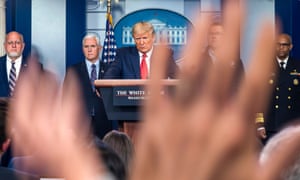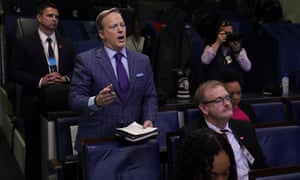The pandemic has brought in-person electioneering to a halt but the president’s daily appearances are unnervingly partisan

Photograph: REX/Shutterstock
For more than an hour from the lectern he self-aggrandises, rewrites history, casts blame, scores political points, goads the media and sends factcheckers scrambling, ceding the bully pulpit only to let other speakers sing his praises.
But for the absence of a sea of “Keep America Great Again” hats and Rolling Stones soundtrack, Donald Trump’s coronavirus press briefings at the White House are, critics say, increasingly resembling his 2020 re-election campaign rallies.
Some critics have even called for TV networks to drop live coverage of the daily sessions because, by carrying the president’s words unfiltered, they are actively misleading their audiences and could harm public health.
“These are rallies by TV press briefing from the podium and that’s not what it should be,” said Mike McCurry, who was press secretary to President Bill Clinton in the 1990s. “It’s not a substitute for a daily briefing by the press secretary, giving real information to the public, taking questions and being held accountable. It’s become a theatrical production rather than a true press briefing.”
The last formal briefing by a press secretary took place more than a year ago as Trump decided to become his own spokesman, regularly fielding questions on the White House South Lawn before boarding the Marine One helicopter in what was dubbed “chopper talk”.
But then came the coronavirus pandemic and the reactivation of the near dormant briefing room in the West Wing. At first, the Vice-President Mike Pence, the chair of the coronavirus taskforce, earned praise for his steady handling of the briefing, with one columnist even joking that he should become the new press secretary.
Perhaps sensing political opportunity, Trump moved swiftly to regain the limelight and become master of ceremonies. At times, he has reassured viewers with an uncharacteristically solemn tone. But at others, he has reverted to his buccaneering style, over-promising vaccines or therapies – forcing experts to contradict him – or throwing a tantrum at a reporter who challenged him.
On Sunday, Trump was asked if he had changed his personal investments in advance of the pandemic. He gave a bafflingly rambling answer that, once transcribed, ran to more than 850 words. An excerpt: “George Washington, they say he was a rich man, supposedly. Relatively rich. And he ran the presidency and he also ran his business. They say he had two desks. Nobody complained until I came along. I got elected as a rich person, but nobody complained until I came along. So it cost me billions of dollars to be president and I am so happy I did it. Because who cares? Who cares?”
Trump regularly appears with taskforce members including Pence, Dr Anthony Fauci, Dr Deborah Birx and Jerome Adams, who stand closer to him than reporters are allowed sit with each other.
Broadcasters were widely criticized for giving Trump’s speeches and rallies wall-to-wall coverage during the 2016 presidential election, granting him free exposure worth billions of dollars in advertising. Although campaign rallies have been suspended because of the virus, there are concerns that history is repeating itself, giving Trump an advantage over his likely opponent, Joe Biden. On Sunday and Monday, the briefings shifted to late afternoon, giving Trump access to peak viewing hours.
McCurry, now a professor at Wesley Theological Seminary, said he “tends to agree” with the view that networks should not carry the entire briefings live.
“Putting it on because it’s better than whatever else is available to daytime TV is not a good reason. It shouldn’t be a platform for the president to just give out his own message. It’s not reality television,” he said.
Margaret Sullivan, a media columnist at the Washington Post, went further in an article headlined: “The media must stop live-broadcasting Trump’s dangerous, destructive coronavirus briefings.” She wrote: “More and more each day, President Trump is using his daily briefings as a substitute for the campaign rallies that have been forced into extinction by the spread of the novel coronavirus. These White House sessions – ostensibly meant to give the public critical and truthful information about this frightening crisis – are in fact working against that end.”

But Sean Spicer, who was Trump’s first press secretary, defended the current arrangement. “The briefings are crucial for the American people to know what the government is doing to address the current situation with the coronavirus,” he said.
Spicer, now a host on the conservative network Newsmax, recently became the first former White House press secretary to question the president that they once served from the briefing room. He added: “You can’t have it both ways. The same press who want briefings every day can’t then complain when they have access to the president and the experts every day.”
Unlike rallies, however, the briefings do provide a chance for reporters to challenge Trump directly.
Joe Lockhart, another former White House press secretary, acknowledged a difficult balancing act for network controllers on whether to keep broadcasting them live. “I’ve been a strong advocate of not putting the president live, taping and checking for accuracy,” he tweeted. “This situation is much tougher. His lies are outrageous and dangerous. But there is a risk of sanitizing his bizarre behavior and saying it’s just Trump. Very hard news decision.”



